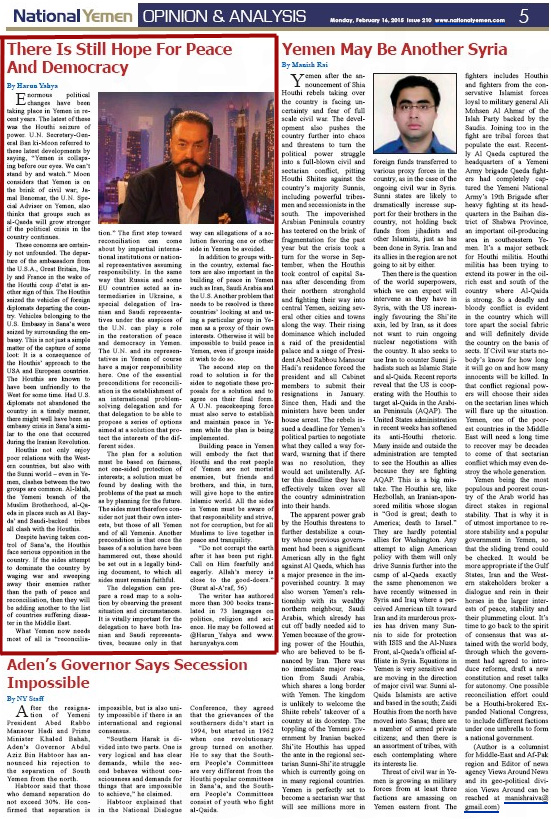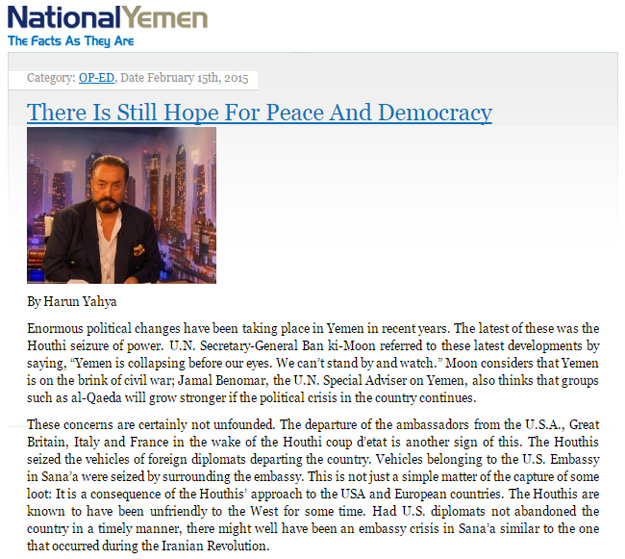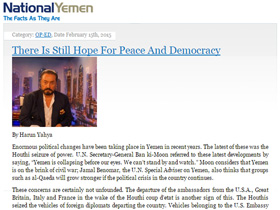
Enormous political changes have been taking place in Yemen in recent years. The latest of these was the Houthi seizure of power. U.N. Secretary-General Ban ki-Moon referred to these latest developments by saying, “Yemen is collapsing before our eyes. We can't stand by and watch.” Moon considers that Yemen is on the brink of civil war; Jamal Benomar, the U.N. Special Adviser on Yemen, also thinks that groups such as al-Qaeda will grow stronger if the political crisis in the country continues.
These concerns are certainly not unfounded. The departure of the ambassadors from the U.S.A., Great Britain, Italy and France in the wake of the Houthi coup d'etat is another sign of this. The Houthis seized the vehicles of foreign diplomats departing the country. Vehicles belonging to the U.S. Embassy in Sana’a were seized by surrounding the embassy. This is not just a simple matter of the capture of some loot: It is a consequence of the Houthis’ approach to the USA and European countries. The Houthis are known to have been unfriendly to the West for some time. Had U.S. diplomats not abandoned the country in a timely manner, there might well have been an embassy crisis in Sana’a similar to the one that occurred during the Iranian Revolution.
Houthis not only enjoy poor relations with the Western countries, but also with the Sunni world – even in Yemen, clashes between the two groups are common. Al-Islah, the Yemeni branch of the Muslim Brotherhood, al-Qaeda in places such as Al Bayda’ and Saudi-backed Sunni tribes all clash with the Houthis.
Despite having taken control of Sana’a, the Houthis face serious opposition in the country. If the sides attempt to dominate the country by waging war and sweeping away their enemies rather than the path of peace and reconciliation, then they will be adding another to the list of countries suffering disaster in the Middle East.
What Yemen now needs most of all is “reconciliation.” The first step toward reconciliation can come about by impartial international institutions or national representatives assuming responsibility. In the same way that Russia and some EU countries acted as intermediaries in Ukraine, a special delegation of Iranian and Saudi representatives under the auspices of the U.N. can play a role in the restoration of peace and democracy in Yemen. The U.N. and its representatives in Yemen of course have a major responsibility here. One of the essential preconditions for reconciliation is the establishment of an international problem-solving delegation and for that delegation to be able to propose a series of options aimed at a solution that protect the interests of the different sides.
The plan for a solution must be based on fairness, not one-sided protection of interests; a solution must be found by dealing with the problems of the past as much as by planning for the future. The sides must therefore consider not just their own interests, but those of all Yemen and of all Yemenis. Another precondition is that once the bases of a solution have been hammered out, these should be set out in a legally binding document, to which all sides must remain faithful.
The delegation can prepare a road map to a solution by observing the present situation and circumstances. It is vitally important for the delegation to have both Iranian and Saudi representatives, because only in that way can allegations of a solution favoring one or other side in Yemen be avoided.
In addition to groups within the country, external factors are also important in the building of peace in Yemen such as Iran, Saudi Arabia and the U.S. Another problem that needs to be resolved is these countries’ looking at and using a particular group in Yemen as a proxy of their own interests. Otherwise it will be impossible to build peace in Yemen, even if groups inside it wish to do so.
The second step on the road to solution is for the sides to negotiate these proposals for a solution and to agree on their final form. A U.N. peacekeeping force must also serve to establish and maintain peace in Yemen while the plan is being implemented.
Building peace in Yemen will embody the fact that Shiites and Sunnis are not mortal enemies, but friends and brothers, and this, in turn, will give hope to the entire Islamic world. All the sides in Yemen must be aware of that responsibility and strive, not for corruption, but for all Muslims to live together in peace and tranquility.
“Do not corrupt the earth after it has been put right. Call on Him fearfully and eagerly. Allah’s mercy is close to the good-doers.” (Surat al-A’raf, 56)
Adnan Oktar's piece on National Yemen:
http://nationalyemen.com/2015/02/15/there-is-still-hope-for-peace-and-democracy/



